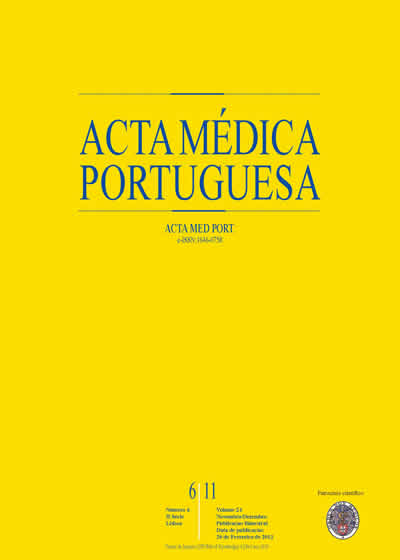Research training in nutrition: relevance for medical clinical pratice.
DOI:
https://doi.org/10.20344/amp.1429Abstract
In oncology, early and individualized nutritional intervention for each patient is essential to improve nutritional intake and status, to reduce morbidity during treatment, enhance tolerance to treatment and improve Quality of Life.For medical students to evaluate nutritional risk and status, analyse the prevalence of undernutrition in a population of patients with diverse types of tumours. We aimed to identify difficulties regarding the use of the MUST tool (Malnutrition Universal Screening Tool) for nutritional risk by the students.This study included 35 cancer patients consecutively referenced for Radiotherapy (RT) in the Radiotherapy Department of the University Hospital of Santa Maria. Nutritional risk was evaluated by MUST; nutritional status by Patient Generated-Subjective Global Assessment (PG-SGA) validated and specific for oncology.Students identified 13 patients (36%) at moderate/high risk of undernutrition. According to PG-SGA, 31,5% (11/35) of patients presented moderate or severe undernutrition, of which 77% of patients needed individualized nutritional counselling. Students successfully detected undernourished patients using these specific methods.Risk of undernutrition and undernutrition are common in oncology, therefore indicating the critical need to educate all health professionals for risk screening and for the relevance of nutritional intervention in the multidisciplinary context. MUST is a simple and quick tool, that demonstrated to be adequate when applied by medical students, well accepted by these health professionals and effectively used. Nutritional risk evaluation can and must be performed by health professionals such as the medical team, as long as they are involved in patient's treatment. Our methodology may be used as a model allowing for early guidance to individualized intervention, human resources' optimization and education for the importance of nutrition care.Downloads
Downloads
Published
How to Cite
Issue
Section
License
All the articles published in the AMP are open access and comply with the requirements of funding agencies or academic institutions. The AMP is governed by the terms of the Creative Commons ‘Attribution – Non-Commercial Use - (CC-BY-NC)’ license, regarding the use by third parties.
It is the author’s responsibility to obtain approval for the reproduction of figures, tables, etc. from other publications.
Upon acceptance of an article for publication, the authors will be asked to complete the ICMJE “Copyright Liability and Copyright Sharing Statement “(http://www.actamedicaportuguesa.com/info/AMP-NormasPublicacao.pdf) and the “Declaration of Potential Conflicts of Interest” (http:// www.icmje.org/conflicts-of-interest). An e-mail will be sent to the corresponding author to acknowledge receipt of the manuscript.
After publication, the authors are authorised to make their articles available in repositories of their institutions of origin, as long as they always mention where they were published and according to the Creative Commons license.









